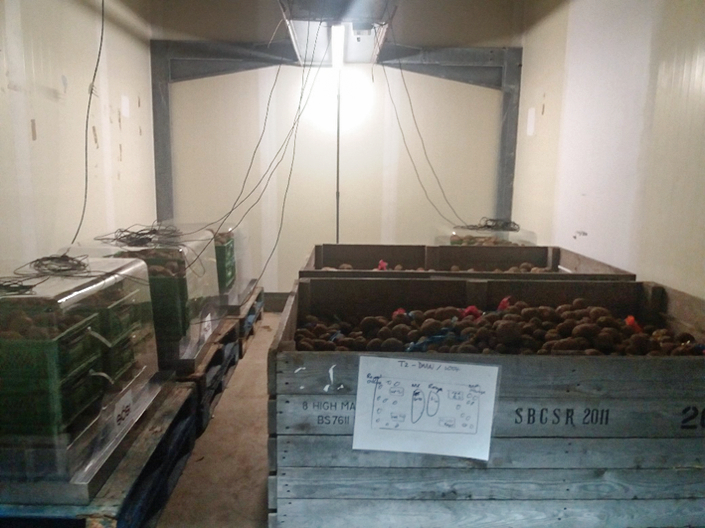Aug 6, 2019P-Pod system could advance storage monitoring of potatoes
For both fresh and processed potato sectors the industry relies on storage for several months. Losses during storage are high, with estimated storage losses of 10% and frequently higher.
In Europe, the industry is facing a particular challenge with loss of the most widely used sprout suppressant, chlorpropham (CIPC). This is especially challenging for the processing sector, given that storage at higher temperatures are necessary to avoid quality problems of sugar accumulation induced by low temperature storage, while at these higher temperatures sprout control becomes more of a problem. Alternative strategies for sprout control exist, but none that are currently available to the European industry are as efficient as CIPC, nor as effective over the range of cultivars and storage conditions. For example, 2,4 DMN is not yet registered for use in Europe.
A consortium of technologists and scientists in the UK and U.S. have been working on an innovative system to develop accurate in-store real-time monitoring of the physiological status of tubers, the rationale being that this will allow more efficient storage protocols accurately tailored to the characteristics of each cultivar so that existing sprout control methods can be more effective. The consortium includes Storage Control Systems in the U.S., the Natural Resources Institute, (University of Greenwich, UK), AHDB Sutton Bridge Crop Storage Research (UK) and Chelsea Technologies Ltd (UK).
P-Pod
At the heart of this concept is the P-Pod, a chamber that can be placed within a commercial store to monitor the status of samples of tubers (80 to 100 kilograms) throughout the storage period. The concept was engineered originally for the apple storage industry; SCS (Storage Control Systems) developed the SafePod which can be placed within apple stores in which the atmosphere is controlled (O2 levels reduced) to slow down fruit metabolism. The SafePod can be controlled in two modes — shared and isolated. In the shared mode, fruit within the chamber are exposed to the same conditions as the rest of the store, while when temporarily set to isolated mode, the pods hermitically seal fruit inside the pod while respiration measurements are performed using high resolution CO2 and O2 sensors.
Measurements of fruit respiration are used to detect and correct stressful storage conditions, and also to determine at what point during storage the fruit starts to lose quality. The P-Pod concept follows a similar rationale for potato tubers; the hypothesis being that respiratory characteristics can be used to detect the onset of sprouting and quality problems such as sugar accumulation. Furthermore, the P-Pod system will allow monitoring of volatile synthesis, and the team are planning to include automatic monitoring of weight loss and are developing sensors capable of following efficiency of skin healing during curing.
Currently, there is little in-store monitoring of tuber quality apart from destructive sampling for sugar analysis and visual inspection for sprouting. Sensors for respiration and skin quality within a pod that can be sealed within a ‘leaky’ potato store environment will provide a significant step change in the information available to manage the store environment and potato quality.
As well as providing a control system to optimize storage conditions, the monitoring information will provide capability to rank stores in terms of tuber maturity and hence manage crop scheduling. Furthermore, the equipment platform developed provides the potential to test the effects of environmental adjustments on tuber quality such as small changes in carbon dioxide and volatile management.
Following successful preliminary trials the consortium is looking for partners to take the development of this system to the next stage.















